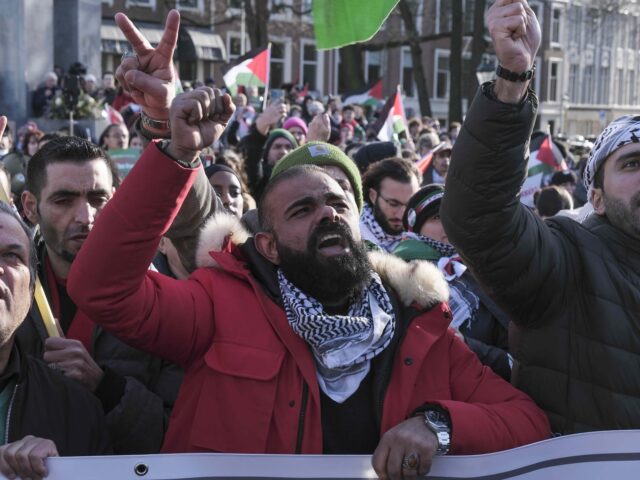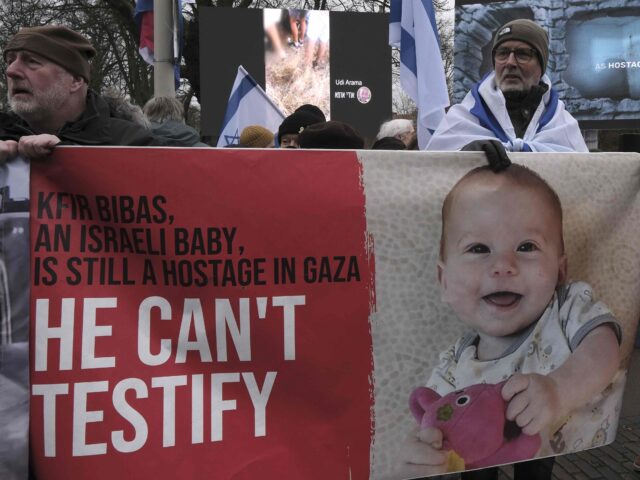The International Court of Justice (ICJ) in The Hague delivered its preliminary judgment Friday on whether Israel is committing “genocide” in Gaza, ordering Israel to produce a report in one month but not making a finding on whether Israel was committing “genocide.”
The ruling took almost no note of the genocidal nature of Hamas’s terror attack on October 7, and only briefly mentioned the Israeli hostages. Bizarrely, Israel’s left-wing former Chief Justice, Aharon Barak, joined the majority in part of a 16-1 ruling.

Pro-Palestinian activists react near the International Court of Justice, or World Court, in The Hague, Netherlands, Friday, Jan. 26, 2024. The United Nations’ top court has decided not to throw out genocide charges against Israel for its military offensive in Gaza. That is part of a preliminary decision in a case that goes to the core of one of the world’s most intractable conflicts. (AP Photo/Patrick Post)
The ICJ was convened by Chief Justice Joan E. Donoghue. She began by outlining the contents of the judgment, first addressing the question of whether the ICJ actually had jurisdiction on the case. She noted that Article IX of the Convention required a “dispute” between the parties for a case to be brought. This was not simply a matter of whether the parties disagreed, but also whether the subject of the dispute fell within the Convention and whether the two parties had indicated a disagreement.
The ICJ agreed with South Africa’s case that because South Africa had stated its views publicly, and in international forums, that Israel was committing “genocide,” it did not matter that South Africa had ignored or mishandled Israel’s attempt to communicate with it under diplomatic procedures.
Justice Donoghue agreed that the acts which South Africa had complained about fell within the convention, and therefore it had jurisdiction, rejection Israel’s effort to have the South African case removed from the ICJ.
Justice Donoghue then noted that under the Convention, any signatory state could bring a case against any other signatory, and that therefore South Africa had standing to bring the case against Israel. In a preliminary finding, she added, South Africa did not have to show that the rights it sought to protect actually existed, but merely whether those rights were “plausible.” She cited the opening articles of the Convention, and said genocide could include an intent to destroy “a substantial part” of a particular group.
Because the Palestinians constituted a “group” of over 2 million people, that qualified them as a “substantial part” of a group that could be protected under the Convention. The ICJ noted that this group had suffered substantial death and injury: “Recent information indicates that 25,700 Palestinians have been killed,” she said, failing to distinguish between terrorists killed in combat on the one hand, and civilians on the other. She cited reports that “Gaza has become a place of death and despair.”
Following the outlines of the South African case, Judge Donoghue then began citing statements by Israeli officials, starting with defense minister Yoav Gallant’s statement that “we will eliminate everything” (in the context of a promise to destroy Hamas), then President Isaac Herzog’s statement that Palestinian civilians had supported Hamas and that “we will break their backbone” (referring to Hamas); and a statement by an Israeli minister that Israel would fight Hamas and that it would cut off water to Gaza.
Judge Donoghue did not mention the fact that Israel has, in fact, supplied water, electricity, and food to Gaza, nor did she mention the genocidal statements or actions of Hamas. She simply cited the risk to Palestinians to bolster the court’s jurisdiction.
She added that the court had found that the “conditions of urgency” had been met, such as would justify a preliminary ruling, though the ICJ could not yet make “definitive finding of facts” as to whether genocide had, in fact, been occurring in Gaza.
Judge Donoghue said that Israel must “take all measures within its power” under Article II of the Convention to avoid acts that would constitute genocide, to prevent its soldiers from such acts, and to punish public incitement to commit acts of genocide.
She added that Israel should prevent the destruction of, and ensure the preservation of, any evidence of possible genocide. She also ordered Israel to report to the ICJ on the implementation of the restrictions of the Genocide Convention within one month.
Donoghue made a brief statement expressing the ICJ’s concern about the Israeli hostages being held by Hamas in Gaza, calling for their “immediate and unconditional release.” The ICJ did not call for Hamas to stop its attacks on Israeli civilians, nor for Hamas to stop using Palestinian civilians as human shields. And it did not order Hamas to obey the Genocide Convention.
At no time did Donoghue describe the horrific nature of the October 7 attack, except to note, at the start, the fact that it happened.

Protesters waving flags and pictures of the hostages kidnapped during the Oct. 7 Hamas cross-border attack in Israel, attend a protest outside the International Court of Justice in The Hague, Netherlands, Friday, Jan. 12, 2024. The United Nations’ top court opened hearings Thursday into South Africa’s allegation that Israel’s war with Hamas amounts to genocide against Palestinians, a claim that Israel strongly denies. (AP Photo/Patrick Post)
The ICJ’s decision, Donoghue said, was 15-2, with Israel’s former Chief Justice Aharon Barak and Uganda’s Judge Julia Sebutinde opposed on most aspects of the order. There was a 16-1 vote on Israel’s duty to “prevent and punish” public incitement to commit genocide, and to provide humanitarian relief to Gaza, with Barak joining the anti-Israel majority, and only Sebutinde opposed.
Several judges added comments, and Barak issued his own opinion, though these were not read aloud in the open court.
Overall, the ruling appeared bad for Israel, and completely ignored the legal justification for the war. But it stopped well short of calling for an immediate ceasefire, or for a ban on arms sales to Israel, which South Africa had hoped the ICJ would impose.
Notably, even in citing the statements of Israeli officials that supposedly conveyed genocidal intent, the ICJ ignored what South Africa said was the most important statement — a misquote of Prime Minister Benjamin Netanyahu’s citation of a Biblical verse.
As the ICJ was delivering its ruling, pro-Palestinian protesters were chanting genocidal slogans outside the court, such as “From the river to the sea, Palestine will be free,” a call for the total destruction of Israel and its replacement by a Palestinian state.
Update: The Biden administration reiterated Friday that the South African claim of genocide by Israel is “unfounded.”
Joel B. Pollak is Senior Editor-at-Large at Breitbart News and the host of Breitbart News Sunday on Sirius XM Patriot on Sunday evenings from 7 p.m. to 10 p.m. ET (4 p.m. to 7 p.m. PT). He is the author of the recent e-book is How Not to Be a Sh!thole Country: Lessons from South Africa. His recent book, RED NOVEMBER, tells the story of the 2020 Democratic presidential primary from a conservative perspective. He is a winner of the 2018 Robert Novak Journalism Alumni Fellowship. Follow him on Twitter at @joelpollak.
